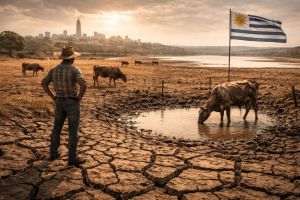The European Court of Auditors (ECA) warns in a report published yesterday that the EU's dependence on China for raw material supply chains, the lack of qualified personnel, as well as the damage to other branches of economic activity, such as fishing, represent the main risks for completion of projects for the development of energy production capacities from offshore renewable sources.
ECA auditors show that one of the socio-economic implications of developing offshore renewable energy is related to the supply of critical raw materials, which can slow down the implementation of EU offshore renewable energy projects as long as the materials are almost fully supplied of China, which also plays a key role in the production of permanent magnets for wind turbine generators.
The EU's reliance on China can create bottlenecks and auditors raise questions about security of supply amid current geopolitical tensions.
In terms of solutions that could be used in the offshore space, the report shows that floating wind technology is attractive for deep-water sea basins, as it allows the deployment of floating installations in waters deeper than 50 meters.
The cited document states: "This technology is compatible with the conditions of the member states bordering the Atlantic Ocean, those bordering the Mediterranean Sea and, possibly, those bordering the Black Sea. By the end of 2021, 27 MW of floating offshore wind capacity had been installed in the EU. According to a 2022 study by the Joint Research Centre13, there is a backlog of projects that will lead to the installation in EU Member States of a capacity for floating technology of 247 MW by 2025. Furthermore, according to this study, costs are expected to of floating wind technology will decrease significantly by the end of this decade and become comparable to those of installations fixed to the seabed."
• Compensation mechanism in France, for fishermen's associations
The report finds that offshore renewable energy rarely coexists with other areas of activity, particularly fishing, with fishermen's trade associations preventing more offshore projects from taking place.
Katarzyna Radecka-Moroz, coordinator of the report drawn up by the ECA auditors, stated, yesterday, in a press conference, that there are big problems in Spain and France regarding the construction of offshore wind farms in areas known until now for intensive fishing.
Mrs. Radecka-Moroz said: "There are fundamental concerns about the jobs that are being lost in fishing, as well as the decrease in income from this field of activity, but also the sharp increase in competitiveness between fishermen due to the reduction of the areas where they can they can fish The biggest problems were in Spain, where the authorities had to redefine the areas where offshore wind farms would be built. Unlike Spain, in France a compensation mechanism for fishermen was established, a mechanism that reduced the number of their conflicts with the development of offshore wind farms. That is why we believe that before the maritime spatial plans are adopted, they should be discussed, transparently, with all social partners, because otherwise it will happen like in Spain, where certain projects to develop offshore wind production capacities were reassessed and relocated".
• 30% of companies in the field face a lack of qualified personnel
Another issue noted by the ECA auditors in the cited report is that the development of offshore renewable energy will have major social implications in terms of employment, infrastructure and services.
ECA experts say in the report: "The sector is experiencing significant growth: in 2020, 77,000 people were directly and indirectly employed in the offshore wind energy sector, compared to less than 400 in 2009. The largest employer is Germany, followed by Denmark, the Netherlands and Belgium. In order to ensure the further development of the sector, the availability of a workforce with the necessary qualifications, along the entire supply chain, will be essential. In 2021, 30% of businesses in the offshore renewable energy sector faced a challenge how many qualified personnel. One of the ways to attract people to work in the offshore sector is to explore the potential of reskilling and upskilling existing employees who previously worked in the oil and gas sector, which is also a way to mitigate the negative impact of the sector's decline."
Another barrier is represented by the lengthy authorization procedures at the national level. Authorization procedures vary between EU member states. For example, in Germany and the Netherlands (Netherlands), the procedure is simplified, in accordance with European rules requiring a "one-stop shop" approach for the authorization of renewable energy projects. Germany has a single body responsible for developing and carrying out the preliminary assessment of areas for the construction and operation of offshore wind energy installations, the body that authorizes project applications (including all related decisions). In the Netherlands, the duration of the authorization procedure is one of the shortest in the EU, with a maximum of four and a half years between tendering the offshore wind site and putting it into operation. Unlike the two states above, France has one of the longest approval times in Europe for offshore wind installations, with the approval procedure taking up to 11 years. In Spain, the licensing rules date back to 2007 and are currently being revised. As there is no commercial offshore renewable energy installation in Spanish waters to date, no authorization procedure for such projects has taken place.
• Energy from renewable sources - area of major public interest
That is why the European Commission proposed the amendment of the Directive on energy from renewable sources in the sense of the designation by the member states of "areas suitable for the development of projects for the production of energy from renewable sources", on land or at sea. The proposed revision will operationalize the presumption that renewable energy is an area of major public interest and this will allow new projects to benefit from a simplified environmental assessment.
However, according to the report that analyzes in detail the situation of offshore projects in Germany, the Netherlands, France and Spain, the European Union has set ambitious targets for the capacities to be installed in the offshore environment: 61 gigawatts by 2030 and 340 gigawatts by 2050, compared to the current capacity of just 16 gigawatts.
A rapid large-scale deployment of offshore renewable energy installations will therefore be necessary in EU countries, which will require considerable maritime space and funding of around euro800 billion, mainly from private investment .
The ECA auditors show that, starting from 2007, 2.3 billion euros were allocated from the European Union budget for the development of technologies for energy obtained offshore, to which the European Investment Bank added 14.4 billion euros in the form of loans and capital investment.
The press release issued by the ECA after the presentation of the report states: "The EU strategy tries to reconcile this energy with biodiversity, but the European Commission has not estimated its potential effects on the environment, such as the displacement of species and changes in the structure of populations, changes in the availability of food or changes of migration patterns, to name but a few. In general, the auditors express concern that the expansion of this energy in Europe could harm the marine environment, both above and below the sea."
That's why ECA experts claim that any project to build capacities to produce energy from renewable offshore sources must contribute to the objective of the socio-economic sustainability of this type of energy, which must not have a serious impact on the environment either.
















































